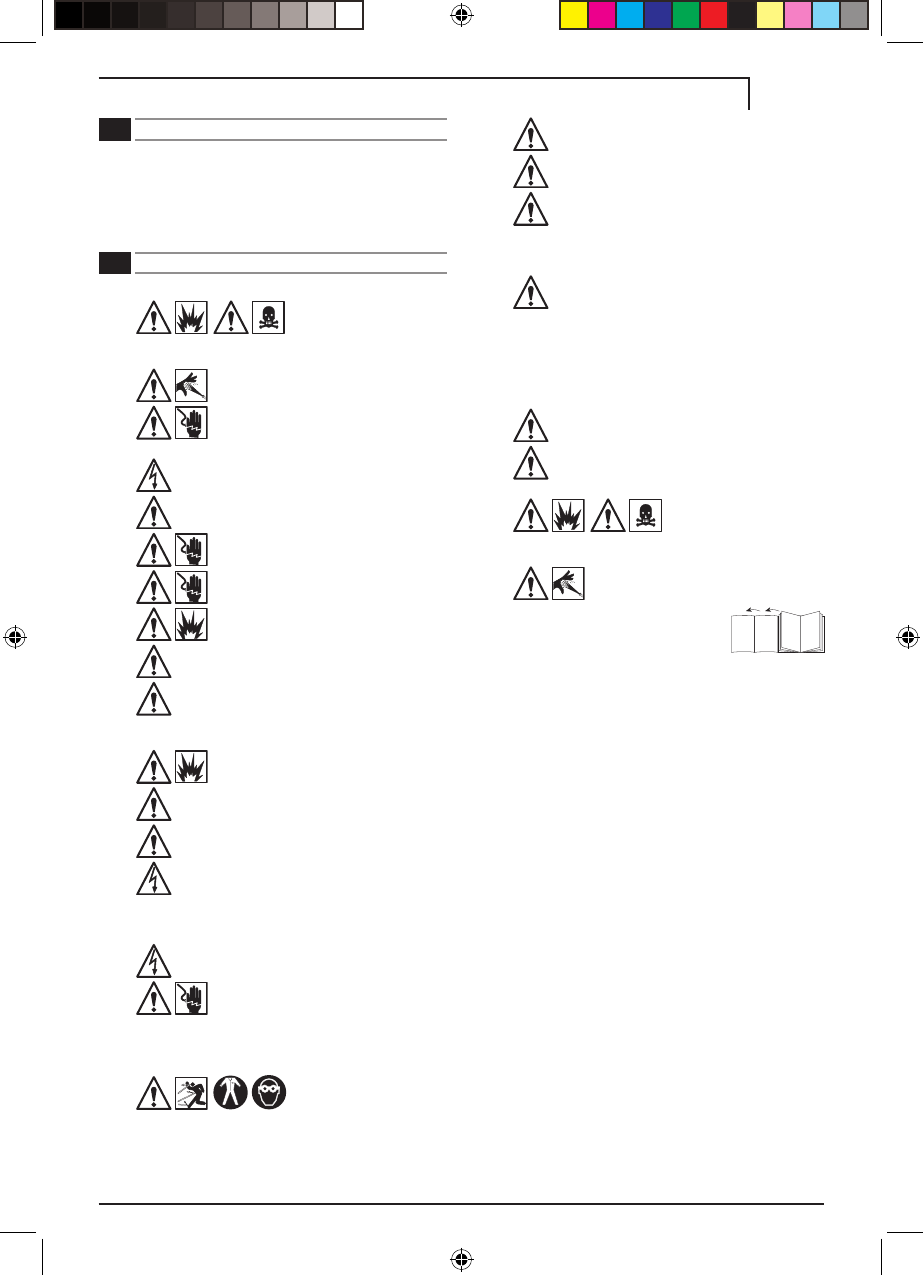
1
SAFETY INSTRUCTIONS
1.1 The appliance you have purchased is a technologically advanced
product designed by one of the leading European manufacturers
of high pressure pumps. To obtain the best performance from your
unit, read this booklet carefully and follow the instructions each
time you use it. We congratulate you on your choice and wish you
successful operation.
2
SAFETY RULES
2.1 SAFETY “MUST NOTS”
2.1.1
DO NOT use the appliance with
inammable or toxic liquids, or
any products which are not compatible with the correct operation
of the appliance. EXPLOSION OR POISONING HAZARD
2.1.2
DO NOT direct the water jet towards people or
animals. INJURY HAZARD
2.1.3
DO NOT direct the water jet towards the unit
itself, electrical parts or towards other electrical
equipment. ELECTRIC SHOCK HAZARD
2.1.4
DO NOT use the appliance outdoors in case of rain. SHORT
CIRCUIT HAZARD
2.1.5
DO NOT allow children or incompetent persons to use the
appliance. INJURY HAZARD
2.1.6
DO NOT touch the plug and/or socket with wet
hands. ELECTRIC SHOCK HAZARD
2.1.7
DO NOT use the appliance if the electrical cable is
damaged. ELECTRIC SHOCK AND SHORT CIRCUIT HAZARD
2.1.8
DO NOT use the appliance if the high pressure
hose is damaged. EXPLOSION HAZARD
2.1.9
DO NOT jam the trigger in the operating position. ACCIDENT
HAZARD
2.1.10
Check that the data plates are axed to the appliance, if
not, inform your dealer. Units without plates must NOT
be used as they are unidentiable and potentially dangerous.
ACCIDENT HAZARD
2.1.11
DO NOT tamper with or alter the calibration of the
safety valve. EXPLOSION HAZARD
2.1.12
DO NOT alter the original diameter of the spray head
nozzle. HAZARDOUS ALTERATION OF OPERATING PERFORMANCE
2.1.13
DO NOT leave the appliance unattended. ACCIDENT HAZARD
2.1.14
DO NOT move the appliance by pulling on the
ELECTRICAL CABLE. SHORT CIRCUIT HAZARD
2.1.15
Make sure that cars do not drive over the high pressure hose.
2.2 SAFETY “MUSTS”
2.2.1
All electrical conductors MUST BE PROTECTED against the
water jet. SHORT CIRCUIT HAZARD
2.2.2
The appliance MUST ONLY BE CONNECTED to an
adequate power supply in compliance with all
applicable regulations. ELECTRIC SHOCK HAZARD
• Use of a safety residual current circuit-breaker (R.C.C.B.) will
provide additional protection for the operator (30 mA).
2.2.3
The high pressure may cause
materials to bounce o surfaces
at speed; therefore protective clothing and safety goggles MUST
BE WORN. INJURY HAZARD
2.2.4
Before doing work on the appliance, REMOVE the plug.
ACCIDENTAL START-UP HAZARD
2.2.5
Before pressing the trigger, GRIP the gun rmly to
counteract the recoil. INJURY HAZARD
2.2.6
COMPLY WITH the requirements of the local water supply
company. According to DIN 1988, the appliance may only
be connected to the mains drinking water supply if a backow
preventer valve with drain facility is installed in the supply hose.
CONTAMINATION HAZARD
2.2.7
ACCIDENT HAZARD
2.2.8
DISCHARGE residual pressure before disconnecting the
unit hose. INJURY HAZARD
2.2.9
Before using the appliance, CHECK every time that the
screws are fully tightened and that there are no broken or
worn parts. ACCIDENT HAZARD
2.2.10
ONLY USE detergents which will
not corrode the coating materials
of the high pressure hose/electrical cable. EXPLOSION AND ELECTRIC
SHOCK HAZARD
2.2.11
ENSURE that all people or animals keep a minimum
distance of 16 yd. (15m) away. INJURY HAZARD
READ INSTRUCTION MANUAL
BEFORE USE
Maintenance and/or repair of electrical components
MUST be carried out by qualied and authorized
Black & Decker sta for the warranty to take eect.
If the supply cord is damaged, it must be replaced by the
manufacturer, an authorized Black & Decker Service
Centre or an equally qualied person in order to avoid a
hazard. If the supply cord is replaced by an equally
qualied person, but not authorized by Black & Decker,
the warranty will lose eect.
17English


















